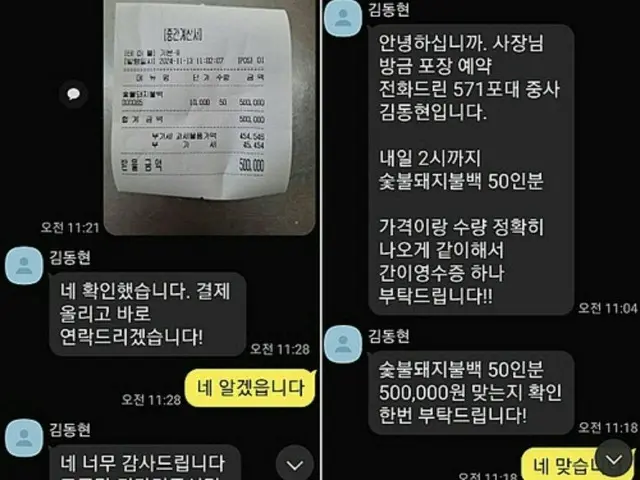A report was received from a restaurant in Young Ji, Jung-gu, Yeongjong Island that "a military unit had lost contact after ordering a group takeout meal."
On the 13th, the restaurant received a message from an unidentified person, A, saying, "We will deliver 50 servings of bulgogi set meals (approximately 500,000 won/approximately 55,000 yen) to the restaurant on the 14th at 2 p.m.
A introduced himself as "Lieutenant Colonel Kim Dong Hee-yeon" of the Air Force and asked for a receipt to be sent to him.
The official document, titled "Unit Food Payment Guarantee Letter," was sent via a mobile phone message. The official document included the unit name, date, location, and official seal of the person in charge, along with the statement, "500,000 yen to purchase food necessary for training."
The letter also said, "Payment will be made when you receive the food." The restaurant, having checked the letter of commitment, prepared the food without any suspicion.
Considering that the food was for soldiers, extra rice and meat were included, and even two crates of mandarin oranges were prepared as dessert.
However, Mr. A called the restaurant on the morning of the day to inquire about the food preparation status.
The victim's daughter posted this on an online community site, saying, "My parents go to the farm market every day early in the morning.
"On the days when we receive a group order from a military unit, we have to hurry up and prepare a sufficient amount and be more careful because it is for soldiers to eat," he said.
"I was preparing for it," he said, expressing his regret. In the end, the restaurant contacted the local community center and volunteer groups through the business association, and donated the food to elderly people and those in financial difficulty in the area.
In the case of this restaurant, although Mr. A did not demand money or induce payment, it is considered a typical "phishing crime disguised as a military officer."
They pose as military officials and use group orders as bait to build trust and then demand money, causing damage to restaurants, butcher shops, florists and other businesses.
If the restaurant owner accepts an order and prepares the food or product even though he/she does not pay the money, it is considered a "no show" (a prepayment).
Damage caused by no-shows (those who make an appointment but don't show up on the day) is inevitable. A police official said, "To prevent damage caused by no-shows, advance payment should be required when ordering in groups," and "We are looking forward to seeing similar damages.
It's still ongoing so we need to be careful."
2024/11/18 11:31 KST
Copyrights(C) Edaily wowkorea.jp 85

